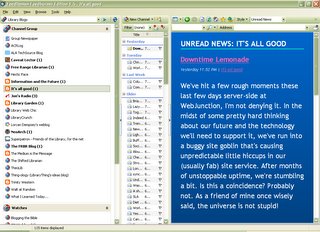The Carnival and other recent blog posts
One way of keeping up with what is happening on library blogs and learning about new blogs is the weekly Carnival of Information Science. The carnival is a weekly "best of" posting that summarizes blog highlights for the week. The catch is that it moves around to different blogs as a way to give them some PR and with each move the editor changes. The link I included above gives you the schedule of where the carnival will be.
If I were the editor here are some blog entries I may include:
http://ericschnell.blogspot.com/2006/07/continuous-learning-making-it.html
Eric Snell posted another guilt inducing plea for more continuing education for librarians but he does include several links to resources he thinks are helpful, including a few podcasts. I've been meaning to investigate podcating and maybe this will get me started on that.
http://ericschnell.blogspot.com/2006/07/why-librarians-should-eat-their-own.html
More guilt from Mr. Snell, this time about the need for librarians to use the tools that their patrons are using.
http://www.librarything.com/thingology/2006/07/tags-reading-and-listening-list.php
Finally the Library Thing put together a reading list on tagging. I confess that I haven't followed up on the links in the post (other than to skim a bit of the first) but if you are interested in tagging (aka folksonomies) these articles promise a meatier analysis than the easy praise or lament that one often finds on blogs.
If I were the editor here are some blog entries I may include:
http://ericschnell.blogspot.com/2006/07/continuous-learning-making-it.html
Eric Snell posted another guilt inducing plea for more continuing education for librarians but he does include several links to resources he thinks are helpful, including a few podcasts. I've been meaning to investigate podcating and maybe this will get me started on that.
http://ericschnell.blogspot.com/2006/07/why-librarians-should-eat-their-own.html
More guilt from Mr. Snell, this time about the need for librarians to use the tools that their patrons are using.
http://www.librarything.com/thingology/2006/07/tags-reading-and-listening-list.php
Finally the Library Thing put together a reading list on tagging. I confess that I haven't followed up on the links in the post (other than to skim a bit of the first) but if you are interested in tagging (aka folksonomies) these articles promise a meatier analysis than the easy praise or lament that one often finds on blogs.







